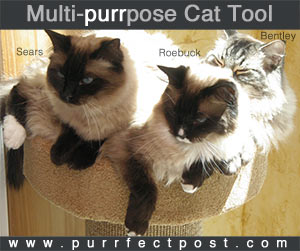Kittens Birth to Weaning
 A lot of exciting things happen in the short period of time between a kitten's birth and weaning. Things usually go just fine, and the soft, bouncy kittens are weaned, then they’re off to start a new life. It is so much fun to watch them grow.
A lot of exciting things happen in the short period of time between a kitten's birth and weaning. Things usually go just fine, and the soft, bouncy kittens are weaned, then they’re off to start a new life. It is so much fun to watch them grow.
One needs to watch the kittens and mom-cat closely, so if things go awry, prompt attention at the veterinary facility can help get things back on track. In some cases, kittens may decline quickly and die due to a number of factors, and we term these “fading kittens.” Reasons for fading may include infections, blood type incompatibility, birth defects, poor mothering, and others.
Newborn Kittens
It is important not to be too intrusive around the birthing area, since a nervous new mother cat may find that stressful. Human handling of the kittens is unacceptable to some queens. She may get aggressive, move her kittens around, or abandon them if really stressed. Remember that the first few days are essential for proper bonding with offspring, so apart from making sure queen and kittens are healthy, and ensuring the nest is cleaned of birthing fluids eventually, resist the urge to get in the way until a routine is established. Mama cat will appreciate your good judgment here.
Colostrum, the first milk the kittens get from mom, contains important protection against disease and must be taken in by the newborn kittens as soon after birth as possible. By 12 hours, the kittens' intestines are starting to close off for protective antibody absorption, and by 16-24 hours of age, their intestines will not effectively absorb these protective components.
Toddler Kittens
For the healthy newborn kittens, growth is fast and furious. Queens are generally excellent mothers, and you probably won't need to help her. She is going to be kept busy with nursing, grooming, and training her kittens how to be cats. A queen will help her kittens understand where the litter box is and how to use it.
An outdoor queen may help her kittens learn hunting skills. Kittens will help each other learn how to interact socially. Play and play fights both help them practice body language and appropriate behaviors they will need to communicate with other cats. Weaning can occur once the kittens eat solid food well, by about 7-8 weeks, but it is desirable to leave the kittens together and with mother until 12-16 weeks so that they can effectively learn life’s lessons about normal cat behavior, etc. and are stronger and larger before the stress of separation.
Monitoring Kittens' Development
Cats can be expected to grow at a fairly standard rate. Weighing them regularly can help to ensure that they are eating properly and gaining weight normally. Early weight gain is usually around 8-10 grams per day. A little kitchen scale will do the trick.
Check the queen regularly for the appearance of her mammary glands. If any unusual swelling, discoloration, or pain is present, contact your veterinarian immediately. Mom cat should be eating vigorously, and the discharge from her birth canal (opening below the anus) should gradually taper off. Abnormal or excessive discharge at the opening of her reproductive tract and a poor appetite or reduced kitten care may indicate problems with her recovering reproductive tract.
If either mom cat or babies are not looking right, don’t wait. Delaying care will only worsen things. The offspring should be observed while being weighed and if they are weak, feel cool, or are not gaining the expected amount of weight, take them into the hospital right away. The newborn does not have much capacity for springing back from stress or infection, so any problem can become progressive quickly if intervention does not occur. Once their eyes open, up until weaning time, daily handling is important for good socialization to people. Brief, gentle handling sessions at least a few times a day are adequate.
Veterinary Visits for Kittens Are Important
Veterinary health care starts before weaning, with routine de-wormings of the kittens. Check with your veterinarian for the prescription de-wormer that is appropriate. De-orming treatments every 2 to 3 weeks for three treatments minimum are necessary to prevent zoonotic (shared by people and pets) parasites from getting established in the kitten. Vaccination can also be discussed at that time.
|
Week 1 |
Nursing every few hours, sleeping a lot, staying close to Mom-cat; she washes their back ends to help encourage urine and feces passage and to keep the kittens and nest clean |
|
Week 2 |
Eyes open. All newborn kittens' eyes are blue and will change as they age if they are to have non-blue eyes as adults. If eyes are not open at 14 days, talk to your vet. Starting to stand and move about the nest. |
|
Week 3 |
Starting to try to explore their immediate environment and leave the box; first de-worming treatment should be given. |
|
Week 4 |
Starting to eat Mom-cat's food; quite mobile. |
|
Weeks 5,6 |
Much less frequent nursing, quite independent, and enjoying short forays around their home; eating well on their own, continuing to nurse at long intervals, and using the litter box. Second de-worming treatment at 5 weeks of age. |
|
Weeks 7,8 |
Third de-worming treatment, first visit to the vet and most likely, the first vaccine. Vaccine scheduling may vary considerably; your veterinarian will know what is best for the litter. Weaning may be done at this time, though many breeders prefer to keep their kittens with the mother until 12 weeks of age. |
It doesn’t take long for the babies to become little independent curious kittens!
You May Also Like These Articles:
How to Care for Orphaned Kittens
Normal Feline Birth and Dystocia
Normal Feline Reproductive Behavior
Notice: Ask-a-Vet is an affiliated service for those who wish to speak with a veterinary professional about their pet's specific condition. Initially, a bot will ask questions to determine the general nature of your concern. Then, you will be transferred to a human. There is a charge for the service if you choose to connect to a veterinarian. Ask-a-Vet is not manned by the staff or owners of CatHealth.com, and the advice given should not delay or replace a visit to your veterinarian.





